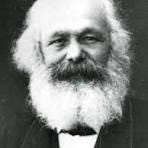Kamala Harris is indeed a Marxist. So is Donald Trump.
We’re all Marxists! The U.S. has adapted 9 of 10 planks of the Communist Manifesto
Please tap the {{heart}} button, which helps new readers find All Predictions Wrong.
Pointing across the debate stage, Donald Trump said, “Everybody knows she’s a Marxist.”
Trump was right – Vice President Harris is indeed a Marxist. He ought to know, since Trump is a Marxist too.
Most leading contemporary figures in American politics, business and academia are Marxists. They just don’t use the term.
A reason capitalism did not collapse is that America adapted nine of the 10 planks of the Communist Manifesto.
Adjust for antiquated figures of speech -- as this essay will -- and the Manifesto, published 1848 in London, reads like the core policies of the world’s capitalist nexus: the United States, European Union and Japan.
If Karl Marx appeared on Hannity, like all other guests Marx would say: “You’re absolutely right, Sean!” Cartoon by Owen Lotts.
The Communist Manifesto did not contain many of the strident concepts found in other of Marx’s writing. Mainly it concerned providing for the needs of society while achieving humane conditions for the common person. That Lenin, Stalin and Mao would twist this vision into horrific oppression was not Marx’s doing.
The Manifesto was published as a pamphlet. America’s Founders also were big pamphleteers – this being a primary form of political communication before mass media.
The 10 planks of the Communist Manifesto:
One. Abolish private ownership of land, and apply all rents to public purposes. Marx is commonly misunderstood to have wanted to end private property; he wanted to end private property in land.
For centuries before his day, huge tracts of land stayed within families who lived in splendor yet performed no productive role. Thus the phrase: landed gentry.
There was little chance a commoner could own land. Hunting and fishing on aristocrats’ land was forbidden. Farmers were forced to rent from the landed, at outrageous rates. Mortgaging land on which to build a home or business that one would own oneself usually was out of the question.
High-yield agriculture would change the centrality of land to economics. There is a chapter about this in my 2018 book It’s Better Than It Looks.
Today zoning laws, preservation of large tracts as national or state parks or monuments, environmental regulations and the eminent-domain concept have broken the hold of the gentry over most land.
As for “rents,” Marx did not mean the price of an apartment, he meant rentier capitalism – yields from nonproductive monopoly over land, resources or forests. Milton Friedman railed against rentiers too. Friedman and Marx were not that far apart. Today rentiers are at least taxed, not the case in Marx’s time.
Two. A progressive income tax. Considered a blue-sky idea when proposed by Marx – the rich would never allow it! – progressive income levies are the rule in the United States and European Union.
Currently the federal top rate is 37 percent. The California top rate is 13.3 percent; some other states are around 10 percent. The rich in California, New Jersey and other states face paying about half their income as taxes. In Denmark the top rate is 56 percent. Marx would be over the moon.
Three. Abolition of inheritance. This is the one plank that has not been adopted. Trump, who began his business career by inheriting about $400 million, knows well.
Estate taxes, which did not exist in Marx’s time, somewhat diminish the ability of the very rich to hoard multigenerational wealth. But clearly Marx did not get his way here.
America’s Founders also were concerned with multigeneration family empires that freeze out average people. Since the early days of the republic, most U.S. states forbid “entail,” an old-English system in which sons who inherit property are forbidden to sell to anyone outside their immediate family.
Four. Confiscation of all property of all emigrants and rebels. Marx wanted to prohibit migrants from changing countries. He’d fit right in on Sean Hannity today! Perhaps Marx could host a nightly Fox News show called Karl’s Korner where he rants against migrants eating pets in Ohio.
Marx felt that if laborers could migrate, they would flood any nation where wages and social conditions were favorable – spoiling things for the successful nation. He’d worry this is happening right now in the United States and European Union.
By “rebels,” Marx meant what we now call terrorists. There’s no doubt Marx would endorse the maxim, “The United States does not negotiate with terrorists.” Violent anarchists were a problem in the Europe of his day, and unlike Lenin, Stalin and Mao, Marx hoped to avoid violence.
Photo courtesy the Daily Pennsylvanian.
Five. Centralized credit in the hands of the state, via a national bank. Private banks of Marx’s time made it nearly impossible for non-aristocrats to obtain credit. The money supply was rigged for the rich. Today there is the Federal Reserve, the European Central Bank, the Bank of Japan – Karl, your wish came true.
There’s a coming All Predictions Wrong on how in addition to all being Marxists now, we are all now Free Silver advocates.
Six. Centrally controlled communication and transportation. In Marx’s time there were dozens of newspapers in London and Berlin, pamphlet-printing shops abounded. Marx wanted central planners to control all this messy freedom of speech!
Today, while person-to-person communication is unrestricted, a small number of large media companies in the United States and Europe dominate the airwaves and social media.
As we learned from the Twitter Files and Mark Zuckerberg’s recent apology to Congress, the “centrally controlled communication” industry censored disfavored speech and suppressed stories (Hunter’s laptop) those in power did not like. This is right out of the Communist Manifesto playbook.
Today most transportation via aircraft or train is centrally controlled, as Marx hoped. Highways are the wild west.
If you’d told Marx in 1848 that someday typical working class persons would own a vehicle that travels 75 MPH and goes wherever the driver wishes to go without getting approval from anyone, he would have thought you’d taken leave of your senses.
Seven. Extension of factories owned by the state, cultivation of barren lands, improvement of the soil. In the United States, European Union and Japan, most factories are privately owned, but inexorably linked to the state by regulations, subsidies and industrial policy. On occasions, factories are nationalized. (General Motors in 2009, Volkswagen in the 1950s.)
By “barren lands” Marx meant what we now call nature, and seek to preserve. A lot of “barren land” has been cultivated in the Midwest and other places. “Soil improvement” and hybrid crop strains have been an essential achievement of Green Revolution agriculture across the world – why food production keeps increasing faster than population.
Image courtesy Marx-Engels Image Library.
Eight. Equal liability for labor and establishment of armies for agriculture. “Equal liability” meant what we now call fair-labor laws and independent labor unions.
Marx never would have believed capitalists and laborers would make peace with each other’s existence via labor law and collective bargaining. It can be argued the labor movement is the most fundamental reason capitalism did not collapse. The labor movement has been good for average people -- both by winning them fair deals and getting employers to offer fair deals so workplaces don’t unionize -- yet also has kept CEOs in their summer homes.
Marx was a Malthusian, thinking rising population would outrun food supply. Instead today we have too much food: across the world, there are more obese people than the hungry. Marx envisioned “armies for agriculture” engaged in a desperate rear-guard action against global starvation. The Green Revolution made this aspect of the Communist Manifesto moot.
Nine. Combination of agriculture and manufacturing; gradual abolition of the distinction between city and countryside. The agribusiness industry seems right out of Marx’s notebooks.
As for city mouse and country mouse, in Marx’s time the countryside was feudal – people were poorly educated, easily manipulated. In cities were newspapers, political rallies and labor organizing. Marx thought gradually combining urban and rural would raise knowledge levels and help workers unite.
Today everyone in Smallville, Kansas, knows what everyone in Manhattan knows. The city/country distinction is largely a lifestyle choice.
Ten. Free public education for all children, and the abolition of child labor. Done and done.
Marx believed that if the Communist Manifesto were realized, prosperity would rise, inequality would decline, war would go out of style, people would live long happy lives and most stresses of existence would be resolved. The masses would no longer be alienated.
Now the West has nine of the 10 goals of which Marx dreamt. There is far more prosperity and freedom than he would have thought possible. In America, the major presidential candidates back the forms of governance Marx wanted, if not consciously so.
But stress and alienation continue, big time. We await the Humane Conditions Manifesto.
Bonus: Calling Pitch Meeting. Marx and Engels belonged to an organization known as the League of the Just. Is that a Marvel movie waiting to happen or what?
Bonus: the Original Russian. During the Red Scare, Senator Joe McCarthy of Wisconsin said, “I’m learning Russian so I can read Karl Marx in the original.” Marx wrote in English and German.
Bonus: Fact-Checking ABC News. During the debate, David Muir called the former chief executive “President Trump” and “Mister President.” These are not proper terms of address.
First, Trump is not the president – Joe Biden is. (Unless Brynleigh the intern is running the country.) Donald is no more “President Trump” than Kamala is “President Harris.”
Second, etiquette in this situation is that a person who once held a title held by many others retains that title, while a person who once held a title held by only one person does not.
Thus a retired judge, admiral or senator may be addressed as “Judge Brynleigh” or “Admiral Brynleigh” or “Senator Brynleigh” for life. But since there’s only one president of the United States, former presidents do not retain the term of address.
Examples: Barack Obama is no longer “President Obama,” and George W. Bush no longer “President Bush.” But “Senator Obama” and “Governor Bush” are fine.
Pedantic? If Muir is going to lecture others about facts, he should choose words with care himself.
Kaitlan Collins also addressed the former president as “President Trump” at the CNN town hall. The stature of the press keeps declining in part because journalists are careless with words.
About All Predictions Wrong
In addition to TMQ on Tuesday through the NFL season, there will be an All Predictions Wrong, on an eclectic range of topics, on most Fridays, plus bonus editions depending on news events.







I’d be willing to beat one of the conditions agreed upon for the debate was the requirement to address Trump as President Trump or Mister President. That guys ego, plus it ties into the lie that he was really elected in 2020.
I think Trump actually called Harris a “Marxist communist fascist socialist,” which is like calling someone a Progressive liberal conservative republican.